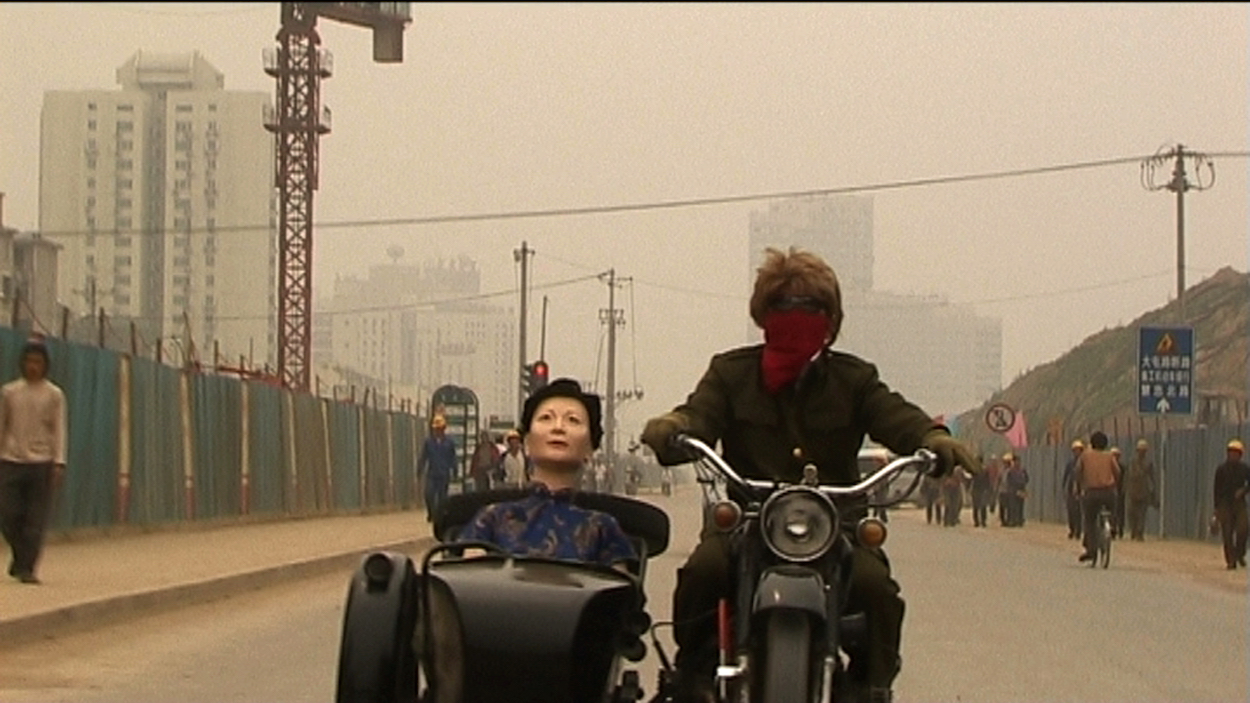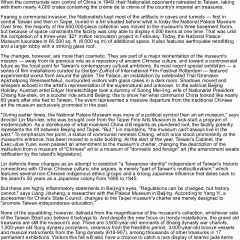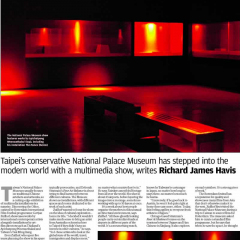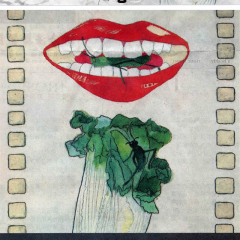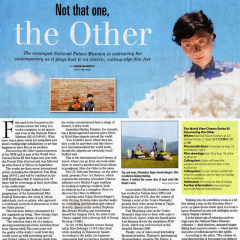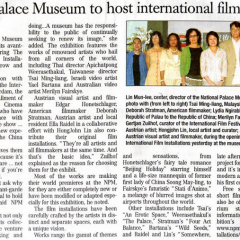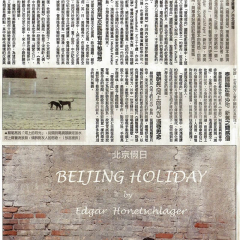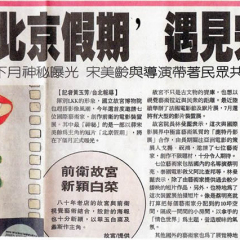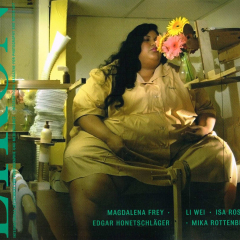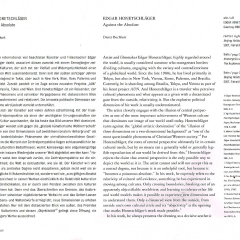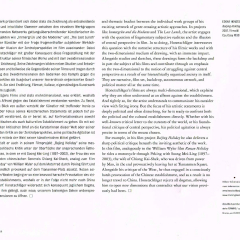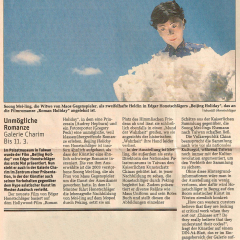BEIJING / TAIPEI / VIENNA 2007, short film, installation
Film available at https://vimeo.com/ondemand/beijingholiday
BEIJING HOLIDAY is a fairy tale. An ironic adaption of William Wyler’s ROMAN HOLIDAY which featured Audrey Hepburn and Gregory Peck. BEIJING HOLIDAY is a romance between the former first Lady of China, Soong Mei-Ling and the filmmaker Edgar Honetschläger. He, the blond Westerner, guides the sophisticated Lady Chang Kai-Shek = Soong Mei-Ling through a thriving Beijing, showing her, what the very communists that won out against her, were doing at present.
BEIJING HOLIDAY isn’t a cute puppet show. The film, by means of symbolism and metaphors, utters harsh criticism on how “naive” the West is dealing with mainland China. The filmmaker is politically not in favour of Soong Mei-Ling (even though he has to admit that he fell for her as a man) or the Kuomintang, the ruling party of Taiwan. BEIJING HOLIDAY deals with the “fetish politics”. The film clearly states: Art need not be political, but it is a sign of a “sane” society, a functioning democracy, if the arts can be.
The piece is in the collection of MUDAM LUXEMBOURG.
please scroll down for a political statement below.
Please find a trailer and the film below:
13 min, edition 5+1
Vienna / Tokyo / Taipei / Beijing 2007
actors: Soong Mei Ling / Edgar Honetschläger
camera: Sylvie Guérard / Thomas Woschitz
editor: Thomas Woschitz
assistant director / production manager: Houxiu Nagaoka
written and directed by Edgar Honetschläger
production companies: Com Institute Tokyo / Edoko Institute Vienna
premiere at “Discovering the Other” curated by Gertjan Zuilhof for the National Palace Museum Taipei, with YAEL BARTANA, APICHATPONG WEERASETHAKUL, DEBORAH STRATMAN, ELLA RAIDEL, HONGJOHN LIN, MERILYN FAIRSKYE, TSAI MING-LIANG
If you are interested in the full movie please send a request to eh@akis.at
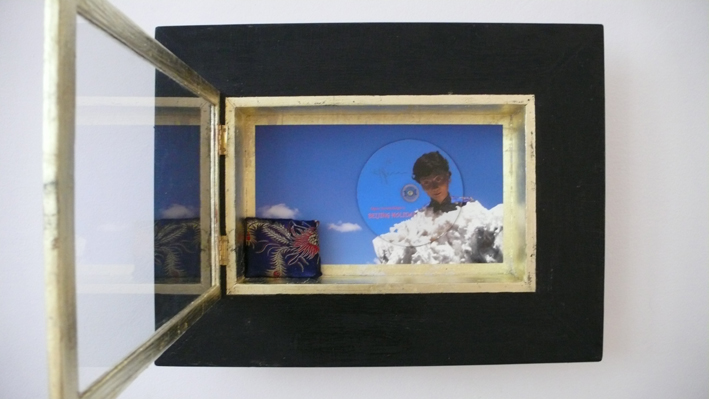
The National Palace Museum in Taipei holds 700.000 artefacts that General CHIANG KAI-SHEK, the husband of Lady Chang Kai-Shek had taken with him from mainland China when he fled from the Communists to the island, formerly known as Formosa. He turned the island into the “Republic of China” against the main lands “People’s Republic if China”. Until today mainland China claims that those artefacts were stolen and they rightly belong to the mainland. By killing millions of intellectuals during the cultural revolution, MAO had 5000 years of Chinese history erased. Had those artefacts fallen into the so called revolutionary’s hands, none of those pieces would exist anymore. If you want to learn about the historical glory of China etc. you need to go to Taiwan as on the mainland, in the people’s republic of China, almost all cultural assets have been destroyed. Kids in mainland schools do not learn about China’s past – for them history starts after the Cultural Revolution…
Once the National Palace Museum (for historical Chinese artefacts) in Taipei had been set up Madame Chiang Kai-Shek, who had been educated at Wellesley College in Massachusetts, became its director. Her father who had lived in the US had made heaps of money selling millions of bibles in Chinese language to the Chinese people and he had been a major sponsor of the anti-communist movement. Miss Song Mei-Ling, later Mdm Chiang Kai-Shek, had wanted to talk the American people into moving their interests during WW2 away from Europe to China and help set China free from Japanese occupation. The owner of TIME LIFE magazine who gave in to her charms sent her on a PR tour from NYC via DC (where she spoke as the first woman ever and on top of it Asian in front of the Senate) all the way to the Hollywood bowl. She was good looking, super smart, spoke American english accent free and was very charismatic. Back then she was so famous that she was mentioned in Hollywood films (to be seen at the end of the movie). She was for sure the most famous Asian woman in the USA at her time. When I saw got to see her for the first time I fell in love with her and her courage. I decided to make a film about her for the museum in Tapei, well honestly I’d wanted to make a movie that would criticise Western intellectuals and artists on how hey were dealing with mainland China: take the money from a regime that would kill dissidents and run.
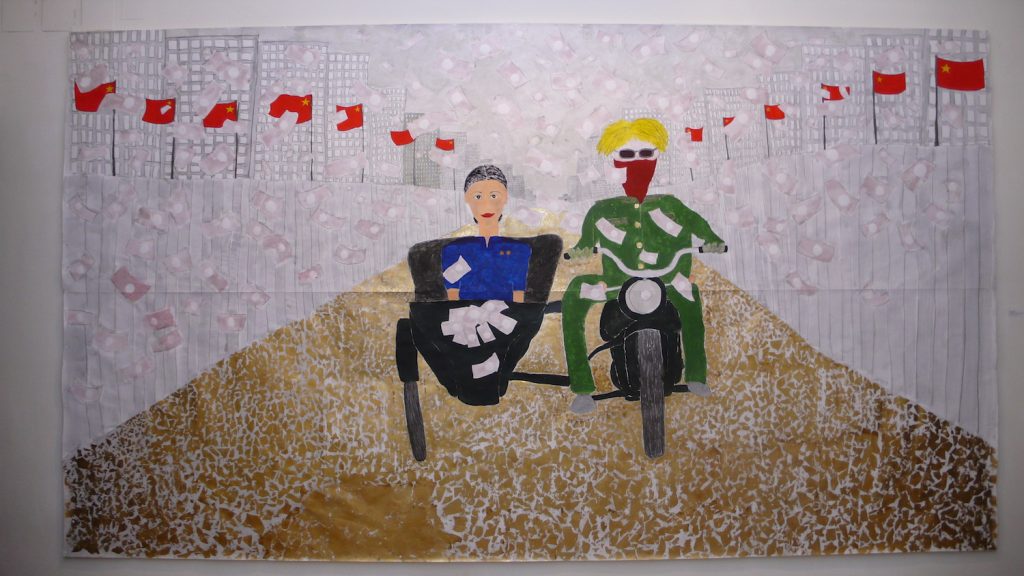
As soon as I had figured out what I wanted to do I tried to find art experts in Beijing who’d be willing to help me. Nobody wanted to help as soon as I told them what I was planning on. ‘You want to have a doll made of Mdm. Chiang Kai-Shek and put her on Tiananmen Square? The very square where the democratic movement in 1989 had been violently crushed?” They called me insane. In 1989 while I’d been living in Williamsburg/Brooklyn I got to see the images on TV – until today I can’t erase the images, the brutality of the regime from my head… From sculptors to famous curators to possible film crew members – nobody in Beijing was willing to take the risk of helping me. . Eventually only non-Chinese were willing to get involved.
Against all resistance and fears I did drive with Madame Chiang Kai-Shek in a motorbike through BEIJING and then I put her on Tiananmen Square right in front of MAO’s image at the entrance to the forbidden city. We put a red ‘MAO Bible’ into the doll’s hands to make sure that they would not bust us right away. My Japanese assistant (a buddhist monk) who spoke Chinese very well had found a Japanese/European crew – among them a fantastic brave camera lady from France and we filmed Mdm Chiang Kai-Shek there – right at the spot where the communists had killed so many students who’d been fighting for freedom. As some of the surrounding young red army soldiers asked us who the doll was (they were very suspicious) my assistant told them that the doll was his diseased grandma from Japan, a communist, who had always wanted to visit Tiananmen square.
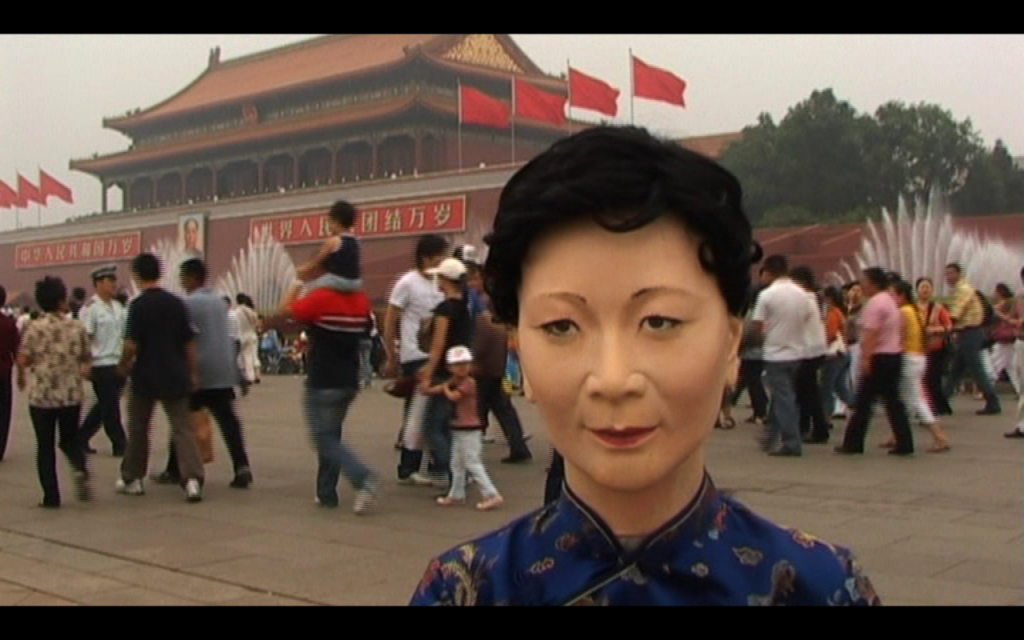
For the Taiwanese Mdm Ching Kai-Shek is the mother of their nation but for mainland Chinese she is the incarnation of evil – 1.3 million Chinese learn that in school. One has to note that Mdm Ching Kai-Shek’s brother used to be the Chinese Treasurer before the communists took over and no doubt her family was corrupt – one reason why the communists did win out…
Before the show opened the director of the National Palace Museum Taipei learned that I had done a political film for the group show curated by Gertjan Zuilhof including Tsai Ming Liang, Apichatpong Weerasethakul, Yael Bartana and Deborah Stratman. She asked the curator to be shown the movie. The curator would say: ‘Mam, sorry, according to our contract we have no obligation to do so. You will get to see it at the pre-opening.” All her arguments would not soften his position. I guessed that this upper class anti-communist lady had been trained in Tokyo, like the entire Taiwanese elite. Therefore i addressed her in Japanese language, knowing that this could create solidarity – no more I’d be the Western colonialist and invader when speaking the non-Western language of the local upper-class. At first her facial expression reflected astonishment, then she switched back to cool, her Japanese being much better and more sophisticated than mine. She told me that she had gotten her academic degree at the Imperial University of Tokyo. I told her that I respected her position and she answered: “You are aware of how many nuclear war heads are directed against us by mainland China in this very moment? I hope you did not create anything that endangers our people.” I assured her that my film was political but at the same time very charming, that I had hidden the message carefully and it was primarily criticising the West. I granted her to see it. We met at her office which used to be Mdm. Chiang-Kai-sheks office. I’d say: ”Madame, the arts are free, also in this country, but for sure if the content of this movie is going to trigger a political crises then we got to think together what to do about it. By the way, the film is based on William Wyler’s ROMAN HOLIDAY.” She smiled. Everyone in Asia knows and loves this movie starring Gregory Peck and Audrey Hepburn. So we all got to watch BEIJING HOLIDAY in the first lady’s office. It was so silent – one could have heard a needle drop. I was observing the museum director for those ever lasting 13 minutes – a member of the anti-communist party. Sweat built on her refined forehead. At the end of the movie a long silence filled the “sacred room”. Then she gazed at me and whispered: “This ain’t easy but it is ok.” We showed the movie alongside with other brilliant movies in the midst of the cultural heritage of China.
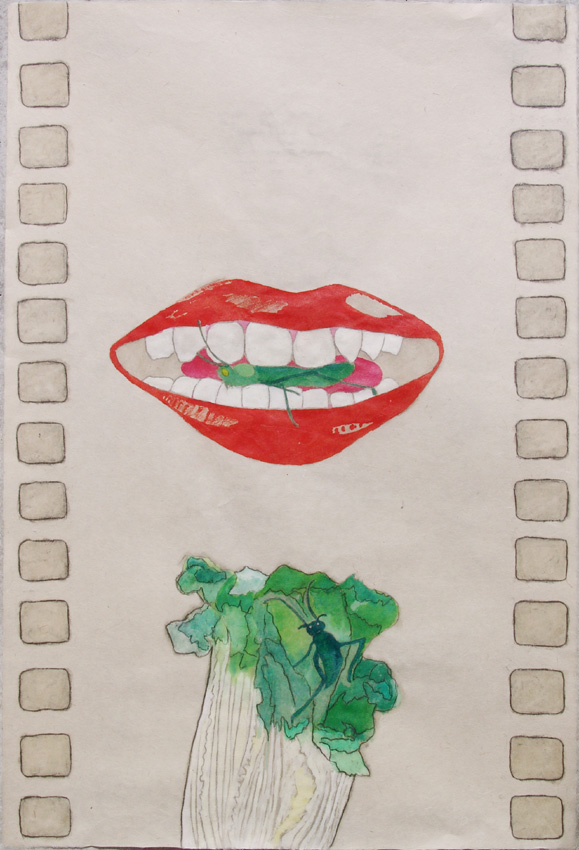
BEIJING HOLIDAY did cause a riot in Taiwan – not for it’s political content but because in the movie the filmmaker and actor kisses the mother of the nation – a sacrilege. It triggered a discussion in parliament if this was to be accepted. Art is not exactly being talked about on a daily basis in Taiwanese parliament. And yes, it was harshly criticized but accepted. Democracy. As a gallery from Taipei brought the movie to the art fair in Shanghai it was confiscated even before the show opened.
Director’s STATEMENT from July 7th 2007
How can anyone – particularly creative minds and intellectuals – deal with and thereby support a system that tortures and kills citizens every day? How can Western intellectuals support a dictatorial, one rule, non-democratic government? For the sake of the arts? For the sake of free expression? Whose? Theirs? Ours? “Freedom of expression” exists only for those who are holding the right passports? How can the Olympics take place in the People’s Republic of China next year? Hitler got his in 1936, is this the argument? How can Western curators believe that they are looking at critical work when they sort out “Chinese art” for their institutions from the – currently – hottest market on the globe?
Westerners do not bother to understand Chinese encodings. They are ignorant and arrogant in the classic colonial manner. They do not understand how Chinese artists are laughing (as the government of the People’s Republic of China does) when ship loads of “critical Chinese art” makes its way to the Western auctions houses and museums. Yes, there is critical Chinese art – but it can only be done by Chinese artists, who are holding non-Chinese passports (Europe, USA, Japan) or who live in the West. The rule still is: criticize the system and you’ll get your head chopped off . Did you know that you cannot use Wikipedia in China? (among many other “harmless” websites). It is blocked. “The great big firewall”, as they call it, keeps Chinese minds away from “dangerous” knowledge.
How can the current gold rush, carried out on the back of the Chinese people, how can it possibly be shared by critical minds? By so called intellectuals? By artists? All for the sake of money? The impressive size of the market? The endless work force, that costs nothing and suffers from unbearable working conditions? The last frontier, the wild East, for an ailing global economy?
Does really anybody believe that dealing with the People’s Republic of China tWesterners do these days, will eventually loosen the tight chains and transfer the “communist empire” into a democratic country? Have the arts become so oblivious and opportunistic that they will be dealing with any kind of political system, regardless of its human rights records?
I am aware that the word DEMOCRACY has been used as a substitute for prevalent colonialism/imperialism in recent decades. Nonetheless we should stand up for it. Free speech – that is what we have – we still do. People in People’s Republic of China do not have this privilege. Western artists should appreciate our constitutional right more than other citizens – after all the foundation of our thinking lies within this guarantee. And artists in “free countries” have the duty to defend this guarantee – as if it was their mothers being threatened, no worse, their own lives. No, we should not collaborate with regimes that stand for the opposite, regimes, that kill for uttering opinions freely – regimes that kill for criticizing their leaders, regimes that kill for lesser reasons than art.
The West has come to submit to the Chinese system. Whoever is in favour of the regime must be so for opportunistic reasons: personal profit, fear, enjoying privileges granted by the regime, promised privileges by the regime. Nobody, who has their senses together and is not bribed by the regime can have any reasons for supporting it.
Where is the solidarity with the dissidents? Where the one with those who fought for freedom at Tiananmen in 1989? Tibet, Taiwan – oppressed nations – nobody wants to solidarise with anymore?
I am scared of the People’s Republic of China – not by the mass of people – but by the party.
I am not saying that art must be political. But it must be able to be political.
